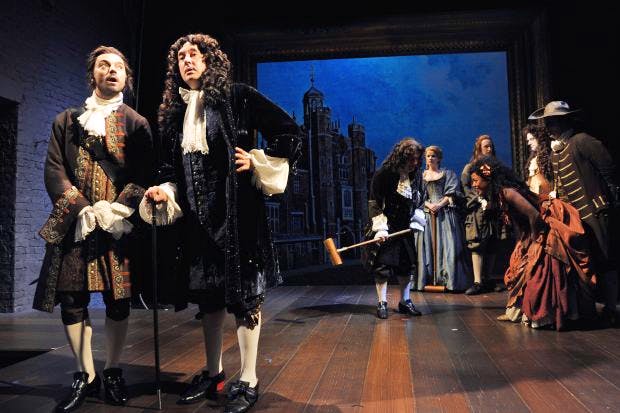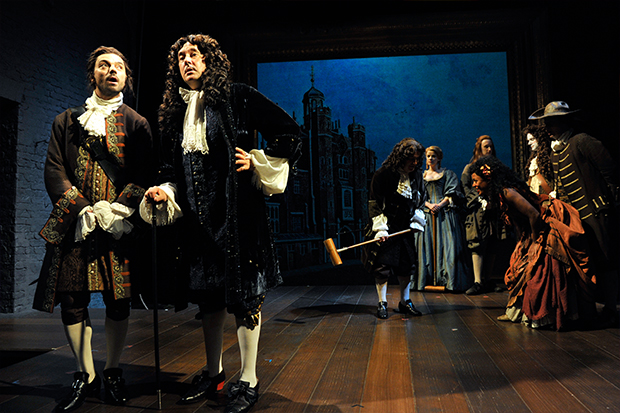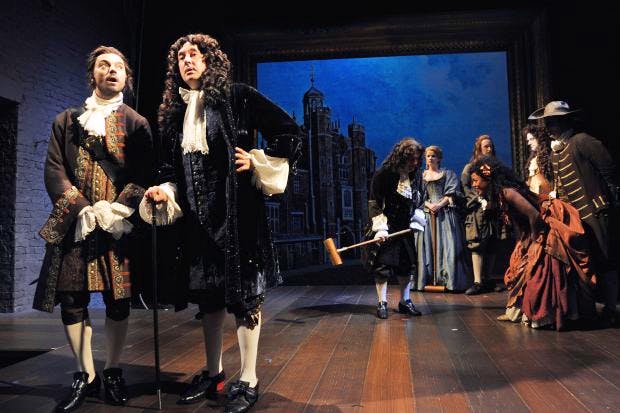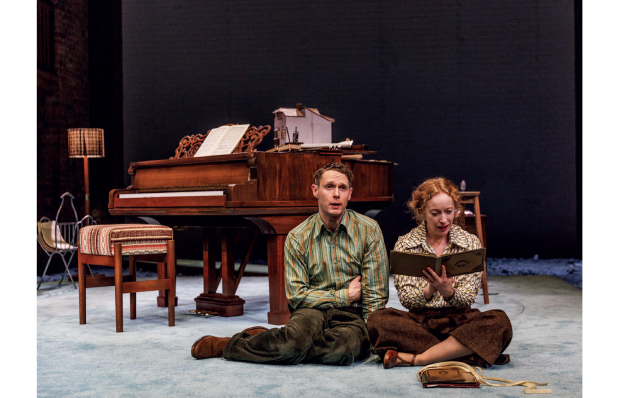Here are three roles all actors love to play. The drunk (no need to learn your lines), the dementia victim (ditto) and the aristocratic roister-doisterer humping his way through the brothels of restoration London. Nothing quite beats the 17th century. Great costumes, stylish language, shoes that add three inches to your height, and a parallel universe of moral licentiousness where every cleavage is there be ogled and every passing bottom pinched. It’s Top of the Pops with silk tights.
Into this land of platitudes walks Dominic Cooper, a super-smooth baddie, who has very little warmth or humour about him, and not a trace of vulnerability. Excellent qualities, it turns out, for the role of John Wilmot, Earl of Rochester, a scribbling philanderer known for his lewd celebrations of erotic excess. The play makes a virtue of Rochester’s misanthropy, and in the opening lines the wicked Earl challenges the crowd to dislike him. He then ambles through a checklist of predictable scenarios. Whores are fondled, wives spurned, grandees mocked, oiks kicked, servants showered with gold. The play suffers from a lack of narrative focus and from several glaring anachronisms. A pregnant actress rejects the Earl’s proposal of marriage claiming that the delights of pursuing a stage career in London, while mothering a bastard, are infinitely preferable to living as a countess and raising her child as the heir to a peerage and a fortune. The only character who can stand up to Rochester is Charles II (Jasper Britton), who grants him a valuable commission, adding, ‘Don’t fuck it up.’ Which is momentarily hilarious. And emblematic of the show’s ambition. A pouty-lipped actor in a Brian May wig saying a naughty word.
One of his lordship’s best-known works celebrates the act of spewing in a tart’s ‘lap’, an anatomical site chosen purely because it rhymes with ‘clap’. These famous lines are witty, self-indulgent and exultantly coarse and they were intended by Rochester for the private amusement of urbane gadabouts like himself. Here he delivers them on stage to a female character and this alters their flavour alarmingly. The literary trifle becomes an offensive diatribe written in a tone of implacable aggression. At the play’s end, the expiring fop repeats his challenge, ‘Do you like me now?’ presumably hoping to elicit cries of ‘ooh yes, you poor misunderstood dumpling’. But there’s very little to relish in this bracing portrait of a vain, brilliant fool who blew his talent on booze and hookers and paid the price. Dead at 33.
Some plays let you know in advance that the auditorium will be a sleeper-lounge by curtain-fall. Father Comes Home from the Wars (Parts 1,2 and 3) is a three-hour grinder by Suzan-Lori Parks. The central figure in her ‘triptych’, as she calls the play, is a black conscript embroiled in the American Civil War. His life is astonishingly uneventful. Hour one: he confesses to betraying a neighbour. Hour two: he helps a comrade escape a white torturer. Hour three: he returns home to find his marital bed fuller than he expected.
In the opening scene the play is merely confusing. Crowds of scruffy chatterboxes are gathered on a doorstep, in the middle of the night for some reason, waiting for the conscript to get out of bed. Some of the chatterboxes wear filthy 19th-century clothes and some wear modern gear, baseball caps and training shoes, equally filthy. Why? Search me. One character is a dog reincarnated as a human being (although I discovered this only after the play had finished). The show consists almost entirely of turgid jabber but, as each section closes, the authoress throws in a series of false climaxes: a mock execution, a failed knife attack, a gun aimed but not discharged. She plays this trick six times or more, unaware that audiences resist cheap attempts to toy with their expectations. The play concludes with a new dawn breaking to symbolise freedom after slavery.
Such banalities reflect the calibre of Parks’s talent. But she’s not to blame for lacking ability. Her career as a teacher of writing may have convinced her that she has nothing to learn. And her pet subject, black history, discourages critics from drawing attention to her ineptitude. For this reason she never receives helpful advice. Only prizes. The Pulitzer, for example, which seems to be reserved exclusively for fashionable bores. She’s also been garlanded with the ever-so-slightly-bombastic MacArthur ‘Genius Grant’. Those conferring the prize in future might be reminded that ‘genius’ is not synonymous with ‘owns a keyboard’. Parks threatens to add half a dozen sequels to this ‘triptych’ which, I now realise, is a technical term meaning ‘a tripartite slab of pious waffle too disorganised to be described as a three-act play’. At her next press night I shall be at home, knitting an important scarf.
Got something to add? Join the discussion and comment below.
Get 10 issues for just $10
Subscribe to The Spectator Australia today for the next 10 magazine issues, plus full online access, for just $10.














Comments
Don't miss out
Join the conversation with other Spectator Australia readers. Subscribe to leave a comment.
SUBSCRIBEAlready a subscriber? Log in